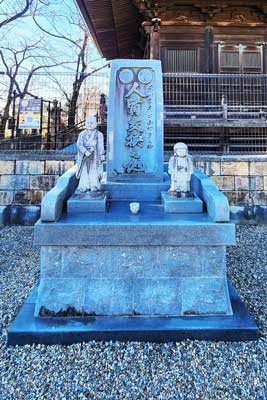2023.03.31
Matsudaira Takechiyo was the childhood name of Tokugawa Ieyasu, unifier of Japan and founder of the Tokugawa Shogunate that ruled Japan from 1603 to 1868. Takechiyo's father, Matsudaira Hirotada, was lord of Okazaki Castle in Mikawa province, but his tenuous hold was threatened by Imagawa Yoshimoto of Suruga to the east, and Oda Nobuhide of Owari to the west.
Choosing to side with the more powerful Imagawa, in 1547 he sent the 6-year-old Takechiyo to Imagawa as a hostage to demonstrate his loyalty, but the boy was kidnapped shortly after departing Okazaki, and sent to Oda Nobuhide.
Takechiyo spent some time as a captive with the Atsuta noble Kato Zushonosuke Nobumori, and later at Banshoji Temple, before he was released to Imagawa Yoshimoto in exchange for Oda Nobuhide's son, Nobuhiro, in 1549.
Kigakurin Banshoji (亀岳林 万松寺)

The temple Kigakurin Banshoji was established in 1540 by the lord of Furuwatari Castle and ruler of Owari province, Oda Nobuhide (father of Nobunaga), as the family temple of the Oda clan. Banshoji was a grand temple, originally located on a 181,500 m² site to the south of the original Nagoya Castle.
In 1610, as the new Nagoya Castle was being constructed, Banshoji was relocated to Maezu (present-day Osu) by the order of Tokugawa Ieyasu.
Banshoji has a deep connection with a number of historical figures. For example, the child Takechiyo spent three years at Banshoji; the infamous outburst at Nobuhide's funeral, when Nobunaga threw incense powder at his father's mortuary tablet, occurred at Banshoji; and the funeral of Haruhime, wife of Tokugawa Yoshinao, the founder of the Owari Tokugawa house, was held here.
Where: Kigakurin Banshoji Temple (亀岳林 万松寺), Naka Ward (中区) Osu 3-chome (大須3丁目) 29-12
Access: A 3-minute walk from Kamimaezu Sta. 「( 上前津」駅, T09/M03) Exit 8 on the Subway Tsurumai Line and Meijo Line (地下鉄鶴舞線・名城線)
Website: https://www.banshoji.or.jp (Japanese)
Tokugawa Ieyasu Hostage Exchange Memorial Monument (徳川家康人質交換記念碑)

Located within the grounds of Ryūfukuji Temple, known popularly as Kasadera Kannon, this memorial commemorates the site of Takechiyo's release from Oda custody. The detailed inscription on the side of the monument reads:
"In 1547, during the time of warring states, caught between the opposing Oda clan of Owari and the Imagawa clan of Suruga, the Matsudaira clan of Mikawa submitted the 6-year-old Takechiyo (the future Tokugawa Ieyasu) as hostage in return for the support of the Imagawa; en route, Takechiyo fell into Oda hands. In 1549, after seizing Anjo Castle and capturing Oda Nobuhiro (elder half-brother of Nobunaga), the Imagawa proposed the exchange of Nobuhiro for Takechiyo, which took place here at Kasadera Kannon. Having recovered Takechiyo, the Matsudaira clan managed to retain its vassals, and would lay the foundations for 300 years of Tokugawa rule. The Kuwagata Matsuri* observed by the Kasadera community originated from this historical event."
The monument bears the family crests of the Oda and Tokugawa, and is flanked by figures representing hostages Oda Nobuhiro and the young Matsudaira Takechiyo.
*The Kuwagata Matsuri is a local festival observed on 5 May in the neighborhoods around Kasadera Kannon.
Where: Ryūfukuji Temple (Kasadera Kannon / 笠覆寺 笠寺観音), Minami Ward (南区) Kasadera-cho Kamishinmachi (笠寺町上新町) 83
Access: A 3-minute walk east from Moto Kasadera Sta. ( 「本笠寺」駅、NH29) on the Meitetsu Nagoya Line (名鉄名古屋本線).
Website: http://kasadera.jp/ (Japanese)




